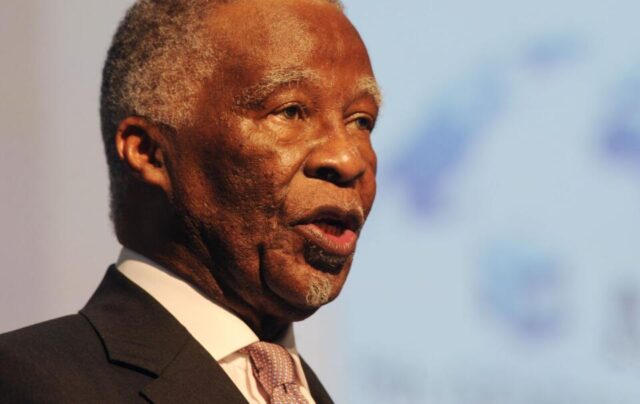Former president Thabo Mbeki has laid the blame for load shedding on black economic empowerment (BEE) and suggested that the power utility’s failures are deliberate.
FORMER president Thabo Mbeki has laid the blame for load shedding on black economic empowerment (BEE) and suggested that the power utility’s failures are deliberate.
As South Africa battles rolling blackouts that have hampered businesses and strangles economic growth, Mbeki highlighted the tenure of former Eskom CEO Brian Molefe, who took the helm at Eskom in April 2014 and had brought load shedding to an end for two years.
Mbeki, speaking at the Unisa Thabo Mbeki African School of Public and International Affairs, said that under Molefe’s leadership the country saw a significant reduction in load shedding.
“Already then in 2014 there was no more load shedding, 2015 no more load shedding, 2016 no more load shedding,” Mbeki noted.
Mbeki praised Molefe’s approach, emphasising the importance of proper equipment maintenance.
“All that they did, Brian and his colleagues, was to maintain the equipment properly so that you don’t have to have these shutdowns,” he said.
However, the former president pointed out that load shedding returned towards the end of 2017, suggesting a correlation with Molefe’s departure.
“So by the time this load shedding comes back in 2017/18, you must be able to guess why. Because you have new people who don’t behave in the way that Brian Molefe behaved,” Mbeki stated, adding, “I think it’s deliberate.”
Mbeki then delved into the saga of the Kusile power station, which, seven years after its construction began, had not produced any electricity.
An Indian company was contracted by Eskom to build Kusile’s Unit Number One, which they completed in a shorter period than expected. However, when it came to extending the contract for further units, Eskom demanded the inclusion of a BEE partner.
@iamnkosenye Thabo Mbeki on ESKOM Crisis #eskom #loadshedding #loadsheddinginsouthafrica #loadsheddinginsouthafrica🇿🇦🇿🇦🇿🇦 #ThaboMbeki #BrianMolefe #matshelakoko #brics ♬ original sound – Nkosenye wa Alkebulan
“So the Indians are expecting that their contract will be extended so that they do unit two and unit three and so on. No, Eskom says to them we will extend the contract on condition you get a BEE partner,” Mbeki revealed.
The Indian company, unfamiliar with the BEE concept and having brought over 150 engineers and technicians from India, offered to include black engineers in their team. Eskom’s response, according to Mbeki, was that they didn’t have such personnel.
The disagreement over BEE led to the termination of the Indian company’s contract and they subsequently left the country. “Kusile is still not finished to this day,” Mbeki lamented.
One of the most pressing issues has been the delay and cost overruns associated with the construction of two major coal-fired power stations, Medupi and Kusile.
Originally envisioned as state-of-the-art facilities to bolster the nation’s power grid, these projects have been marred by technical problems, leading to significant delays and escalating costs. The financial burden of these projects, coupled with declining revenues due to decreased demand and increasing non-payment issues, has pushed Eskom to the brink of financial collapse.
In response to these challenges, the South African government has initiated a series of reforms aimed at stabilising Eskom. These include financial bailouts, operational overhauls, and efforts to increase transparency and accountability.
The introduction of independent power producers (IPPs) into the energy market is also seen as a step towards diversifying the country’s energy mix and reducing the burden on Eskom.
Drawing parallels with other state institutions, Mbeki concluded, “I’m saying it’s deliberate; it’s people who have wanted to produce this electricity crisis in the same way that they wanted to produce a revenue crisis by the destruction of Sars,” he said.
The former president’s comments have ignited a fresh debate on the balance between transformation policies and operational efficiency. As South Africans grapple with the implications of these revelations, the spotlight is once again on Eskom and the broader challenges of governance and policy implementation in the country.








